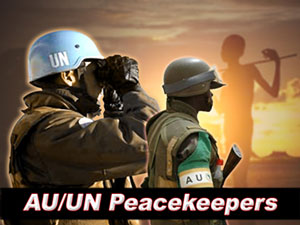- AU chief wants African Darfur force (Al Jazeera, 08-13-2007)
- Darfur, Uganda and the U.S. campaign to destabilize Sudan (FCN, 01-01-2007)
- Darfur, Sudan: Seeking the Truth (FCN Webcast, 05-07-2006)

UNITED NATIONS (FinalCall.com) – The United Nations Security Council on July 31, unanimously approved the “hybrid force” of 26,000 troops expected to be made up mostly of peacekeepers from Africa and Asia. If fully deployed, this would be the world’s largest peacekeeping operation which will absorb and take over from the 7,000-man African Union detail no later than Dec. 31. The key to getting the unanimous vote, according to analysts, is that the Sudanese government pledged its cooperation.

Sudan’s ambassador to London, Omer Siddiq, described Security Council Resolution 1769 as a “step in the right direction,” saying Khartoum had asked the United Nations to help the African Union force, according to an Aug. 1 Agence France Presse (AFP) story.
“The African Union doesn’t have resources and doesn’t have trained people, so we requested assistance from the United Nations and from the international community to come help,” Amb. Siddiq told BBC radio.
In Khartoum, Sudan’s Foreign Minister Lam Akol explained to Reuters why his government finally agreed to the resolution calling for the deployment of the hybrid force.
“It’s practical. It has taken into consideration most of our concerns. We are comfortable with the resolution…Now that we have been part of the discussion we will definitely cooperate with it,” Mr. Akol stressed. He was referring to negotiations in New York which led to the threat of sanctions against the Sudanese government being removed from the final text.
Outside the Security Council’s UN chamber, Sudan’s UN ambassador, Dr. Abdalmahmood Abdalhaleem, recently explained to reporters that the final draft of Resolution 1769 was “a marked improvement compared to earlier drafts and that many of his government’s concerns were taken into account.”
The resolution authorizes the AU-UN force to take “the necessary action” under Chapter 7 of the UN Charter to protect its personnel, ensure security and freedom of movement for humanitarian workers, prevent attacks and threats against civilians and back implementation of the 2006 Darfur Peace Agreement.
The new resolution also acknowledges Sudan’s sovereignty in that the force may not seize or dispose of weapons it may deem illegal–it can only monitor such weapons.
UN said the United Nations African Union Mission in Darfur force, called UNAMID, has a mandate for 12 months, and could cost $2 billion. UNAMID will have “a predominately African character,” as demanded by Khartoum, the UN said.
“This is an historic and unprecedented agreement,” stated UN Secretary-General Ban Ki-Moon, adding that UNAMID would “make a clear and positive difference.” Mr. Ban insisted that the “unequivocal support of the government of Sudan was fundamental.”
But the United States continued to speak from the “bully” pulpit. U.S. Ambassador Zalmay Khalilzad said all parties must cooperate fully with the resolution, and, “if Sudan’s cooperation was not forthcoming, the United States would call for both unilateral and multilateral action.”
However, China’s representative, Ambassador Wang Guangya, emphasized that “pressuring Sudan was not the resolution’s goal.” The next step was faithful implementation of the resolution, the Chinese ambassador stressed.
Qatar’s Ambassador Nassir Abdulaziz Al-Nasser agreed, recalling that the Sudan had in fact initiated the request for the United Nations assistance. “ [The Sudan] had taken many positive steps in partnership” with the world body and the AU, and had “given its consent to the deployment of the hybrid operation,” said Amb. Al-Nasser.
In the Sudan, “we will build peace through negotiations for a political settlement, and sustain peace on the ground,” Mr. Ban stressed.
According to Reuters, the African Union urged all of Darfur’s rebel groups to come to Arusha, Tanzania on Aug. 2, to discuss when and where the groups may hold talks with Khartoum, and how to forge a common negotiating position.
“We would like everybody big or small to be part of it. We want the agreement to be accepted by all stakeholders,” Salim Ahmed Salim, the AU’s special envoy to Darfur, told Reuters.
The Sudanese news service, SUNA, reported on July 26 that Pres. Omar Al-Bashir told delegation of the Catholic Church he “appreciated the role being played by the Christian leaders and clergymen for boosting the political and social peace” in the nation. SUNA said during the meeting in Khartoum, Pres. Al-Bashir “renewed commitment of the national unity government to achieve peace, development and to make available services for all the Sudanese people.”












